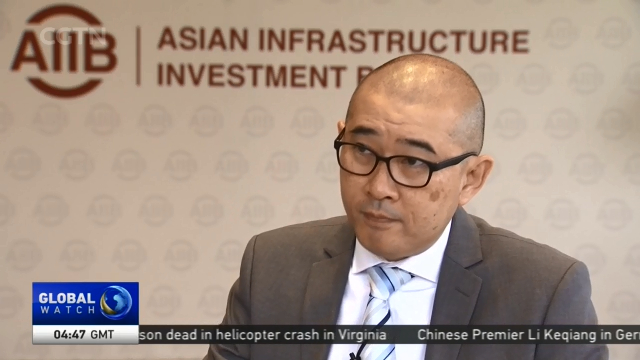
13:24, 09-Jul-2018
China-Arab Financial Cooperation: AIIB: Investments in Arab states could double by year end
Updated
12:43, 12-Jul-2018
03:24

The Asian Infrastructure Investment Bank began operations in January 2016 to provide infrastructure financing throughout Asia and its neighboring regions. Ahead of the 8th Ministerial Meeting of the China-Arab States Cooperation Forum, which will take place in Beijing on Tuesday, our reporter Wei Lynn Tang caught up with a senior AIIB investment official. She checks in on the latest--when it comes to financial cooperation between the China-led multilateral development bank and Arab states.
Just over two-and-a-half years in operation, the Asian Infrastructure Investment Bank, or AIIB, now has 87 members, 10 of which are Arab states.
They include Egypt, Qatar, and Saudi Arabia. The bank, in which China has almost 27 percent voting rights, deems this as a huge endorsement from Arab countries.
WEI LYNN TANG BEIJING "The AIIB has committed over half a billion US dollars to fund projects in Arab states. Compare that however to the estimated 75 to 100 billion dollars of infrastructure that the region needs, annually, over the next decade or so, one could perhaps say this region is still underinvested in AIIB's books."
Thus far, the AIIB has invested in three projects in Arab states and hints it may invest up to 3 more projects by year end, bringing its investments in the region to a billion dollars. This comes as the bank sees participation in Oman and Egypt continuing to deepen. So, what and where next for the multilateral development bank when it comes to investable projects?
PANG YEE EAN, DIRECTOR GENERAL INVESTMENT OPERATIONS DEPARTMENT, AIIB "We are now focusing to the region up North in Jordan. Energy based, connectivity ways, for example in UAE we are looking at railway system, metro systems; and in Saudi we are looking at energy-based solar program."
Due to the diversity of the region, Pang says each country has its own unique situation. This warrants a country view when it comes to assessing risks--before taking on a regional perspective.
PANG YEE EAN, DIRECTOR GENERAL INVESTMENT OPERATIONS DEPARTMENT, AIIB "For example relatively high level of government indebtedness, but I think all this will get over when the market confidence comes in, when the private sector is built up, further strengthen its monetary positions, cutting down on its subsidies. These are very bold moves that they have taken and on its country, this is very positive."
And while Pang sees increasing private sector participation in the region, as Chinese companies and banks participate in Middle East projects, he says this is not enough.
PANG YEE EAN, DIRECTOR GENERAL INVESTMENT OPERATIONS DEPARTMENT, AIIB "I'd say the government needs to initiate more projects that the private sector can take ownership by having bankable projects that have high commercial value, reasonable commercial value and good governance. And the private sector needs to spend more effort understanding the Arabic situation."
Pang says, the AIIB is committed to mobilizing private sector monies into infrastructure, as it believes its high capital expenditure should not fall solely on the government's shoulders. WLT, CGTN, Beijing.

SITEMAP
Copyright © 2018 CGTN. Beijing ICP prepared NO.16065310-3
Copyright © 2018 CGTN. Beijing ICP prepared NO.16065310-3